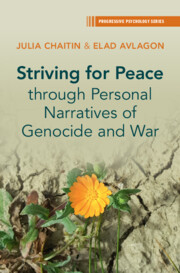Refine search
Actions for selected content:
157 results
5 - The Swedish Iraqi Diaspora: Bottom-up State-Building
-
- Book:
- Diasporic State-Building
- Published online:
- 25 November 2025
- Print publication:
- 18 December 2025, pp 144-183
-
- Chapter
- Export citation
Chapter 10 - Multi-Perspective Memories
- from Part III - Conclusion
-
- Book:
- Historical Trauma
- Published online:
- 20 November 2025
- Print publication:
- 04 December 2025, pp 271-312
-
- Chapter
- Export citation
Chapter 7 - Rwanda
- from Part II - Separate Paths
-
- Book:
- Historical Trauma
- Published online:
- 20 November 2025
- Print publication:
- 04 December 2025, pp 178-212
-
- Chapter
- Export citation
The Prevalence and Correlates of Residential School Denialism in Canada
-
- Journal:
- Canadian Journal of Political Science/Revue canadienne de science politique , First View
- Published online by Cambridge University Press:
- 24 November 2025, pp. 1-32
-
- Article
-
- You have access
- Open access
- HTML
- Export citation
Chapter 2 - Hegel
- from Part I - Post-Kantian German Idealism
-
- Book:
- Modern Moral Philosophy in the Nineteenth Century
- Published online:
- 15 November 2025
- Print publication:
- 30 October 2025, pp 58-96
-
- Chapter
- Export citation
Chapter 9 - Building a Bridge over Babylon
-
- Book:
- Politics and the New Challenge of Migration
- Published online:
- 23 December 2025
- Print publication:
- 09 October 2025, pp 112-128
-
- Chapter
- Export citation
4 - 2003–2005
-
- Book:
- Choosing Defeat
- Published online:
- 07 October 2025
- Print publication:
- 07 October 2025, pp 106-132
-
- Chapter
- Export citation
13 - Christology and the Atonement
- from Part IIIa - Christology and Systematic Theology
-
-
- Book:
- The Cambridge Companion to Christology
- Published online:
- 15 September 2025
- Print publication:
- 02 October 2025, pp 219-233
-
- Chapter
- Export citation

The Cambridge Companion to Christian Liturgy
-
- Published online:
- 19 September 2025
- Print publication:
- 09 October 2025
Chapter 5 - Forgivingness
- from Part II - Virtues of Direct Caring
-
- Book:
- Attention to Virtues
- Published online:
- 25 July 2025
- Print publication:
- 14 August 2025, pp 85-119
-
- Chapter
- Export citation
How Does Public Opinion Respond to Government Injustices Against Historically Discriminated Minorities? Evidence from Norway
-
- Journal:
- British Journal of Political Science / Volume 55 / 2025
- Published online by Cambridge University Press:
- 14 July 2025, e91
-
- Article
-
- You have access
- Open access
- HTML
- Export citation
5 - Disrupting the Hopes of Reconciliation
- from Part II - Confronting Global Contradictions
-
- Book:
- Global Crisis and Insecurity
- Published online:
- 01 June 2025
- Print publication:
- 12 June 2025, pp 114-131
-
- Chapter
- Export citation
11 - Guilt, Freedom and Reconciliation
- from Introduction to Part IV: Towards Abolition
-
- Book:
- Rethinking Criminal Justice
- Published online:
- 17 May 2025
- Print publication:
- 05 June 2025, pp 244-268
-
- Chapter
- Export citation
4 - Love, Guilt and Forgiveness
- from Introduction to Part II: Towards Synthesis
-
- Book:
- Rethinking Criminal Justice
- Published online:
- 17 May 2025
- Print publication:
- 05 June 2025, pp 81-102
-
- Chapter
- Export citation
2 - Young Hegel, Love and the Critique of Punishment
- from Introduction to Part I: Two Beginnings
-
- Book:
- Rethinking Criminal Justice
- Published online:
- 17 May 2025
- Print publication:
- 05 June 2025, pp 29-51
-
- Chapter
- Export citation
Interview with Roberto Carlos Vidal López: President of the Special Jurisdiction for Peace in Colombia
-
- Journal:
- International Review of the Red Cross , First View
- Published online by Cambridge University Press:
- 08 May 2025, pp. 1-8
-
- Article
-
- You have access
- Open access
- HTML
- Export citation
Determinants of Attitudes Toward Reconciliation with Indigenous Peoples
-
- Journal:
- Journal of Race, Ethnicity and Politics / Volume 10 / Issue 3 / November 2025
- Published online by Cambridge University Press:
- 02 May 2025, pp. 674-696
-
- Article
-
- You have access
- Open access
- HTML
- Export citation
When National Narratives Clash in Multinational University Classrooms: A Pedagogical Perspective
-
- Journal:
- Asia-Pacific Journal / Volume 19 / Issue 5 / March 2021
- Published online by Cambridge University Press:
- 14 March 2025, e10
-
- Article
-
- You have access
- Open access
- Export citation
Introduction: The “Comfort Women” as Public History - Scholarship, Advocacy and the Commemorative Impulse
-
- Journal:
- Asia-Pacific Journal / Volume 19 / Issue 5 / March 2021
- Published online by Cambridge University Press:
- 14 March 2025, e3
-
- Article
-
- You have access
- Open access
- Export citation

Striving for Peace through Personal Narratives of Genocide and War
-
- Published online:
- 22 February 2025
- Print publication:
- 13 February 2025

